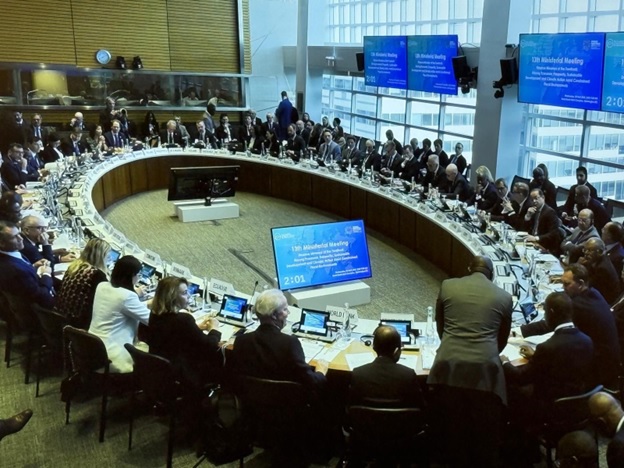


One highlight of his time in Washington was the minister’s participation in the 13th ministerial meeting of the Coalition of Finance Ministers for Climate Action. This issue is a major priority for Pakistan which has suffered dire effects and lost thousands of lives due to global warming over the years
FM Aurangzeb Enjoys Busy Week at IMF Spring Meeting in Washington
By Elaine Pasquini
Washington: On the sidelines of the Spring meetings of the International Monetary Fund and World Bank Group the week of April 21, 2025, Pakistan’s Finance Minister Muhammad Aurangzeb held a flurry of meetings with officials and business organizations.
Minister Aurangzeb thanked IMF managing director Kristalina Georgieva for the Staff-Level Agreement on the First Review under the Extended Fund Facility and a new arrangement under the Resilience and Sustainability Facility.
Reiterating the invitation of Prime Minister Shehbaz Sharif to visit Pakistan, Aurangzeb assured Georgieva of his country’s full support to stay the course on reforms.
During a meeting with Robert Kaproth, assistant secretary of the US Department of Treasury, Aurangzeb briefed him on the macroeconomic indicators of Pakistan. He also highlighted the reforms being undertaken in the areas of taxation, energy, privatization, pensions and debt management. In addition, the minister underlined the importance of the Country Partnership Framework of the World Bank in dealing with existential challenges facing the country including a growing population and climate change.
Speaking with the World Bank’s vice president for South Asia Martin Raiser, the finance minister acknowledged the importance of the World Bank’s 10-year Country Partnership Framework for Pakistan and thanked the Bank for its continued support toward Pakistan’s economic reforms, digitalization and energy sector agenda.
Addressing the Intergovernmental Group of 24 (G-24) meeting of ministers and governors on international monetary affairs and development, in his capacity as Second Vice Chair Aurangzeb pointed out the macroeconomic stability Pakistan has achieved underpinned by the strong resilience of the banking system and the government’s ongoing structural reforms.
In view of evolving geopolitical dynamics, rising protectionism and trade tariffs, the minister emphasized the urgent need to maintain the reform trajectory. Trade corridors and connectivity are of utmost importance for increasing investment in the region, he said, adding that developing countries need greater financial and technical support to significantly navigate global economic challenges.
In discussions with Hela Cheikhrouhou, regional vice president of the International Finance Corporation, the two explored cooperation in private sector reforms, energy transition, sound municipal finance and full employment.
During a meeting with a team from the international accounting firm Deloitte, the minister briefed the group on Pakistan’s macroeconomic outlook, the government’s sectoral development agenda and export-led grown priorities. They explored cooperation in energy sector reforms, along with the prospect of working together to extract and market critical minerals. Minister Aurangzeb stated he was looking forward to getting together with the Deloitte team in Pakistan in May.
In a luncheon meeting with several American corporate leaders held under the auspices of the US-Pakistan Business Council at the US Chamber of Commerce, the finance minister briefed the participants on the improving macroeconomic indicators of the country. He specifically highlighted the reforms being undertaken in the areas of taxation, energy, state-owned enterprises and privatization, underscoring the importance of regional trade, diversification of markets and sectors.
Expressing Pakistan’s desire to continue collaboration with the United States in the mines and minerals sector, Minister Aurangzeb conveyed his appreciation to the US delegation for attending the recent Pakistan Minerals Investment Forum 2025 held in the Jinnah Convention Centre in Islamabad.
In additional productive meetings with institutional investors, Minister Aurangzeb briefed participants on Pakistan’s economic outlook, pointing out the country’s upgrading of its long-term foreign-currency issuer default rating (IDR) to “B.”
One highlight of his time in Washington was the minister’s participation in the 13th ministerial meeting of the Coalition of Finance Ministers for Climate Action. This issue is a major priority for Pakistan which has suffered dire effects and lost thousands of lives due to global warming over the years.
Addressing the large gathering, Aurangzeb announced Pakistan’s development of a Climate Prosperity and Finance Strategy. He also noted that the 10-year Country Partnership Framework with the World Bank includes climate-focused pillars on resilience and decarbonization and he emphasized the importance of embedding climate into macroeconomic and financial policies.
(Elaine Pasquini is a freelance journalist. Her reports appear in the Washington Report on Middle East Affairs and Nuze.Ink.)

